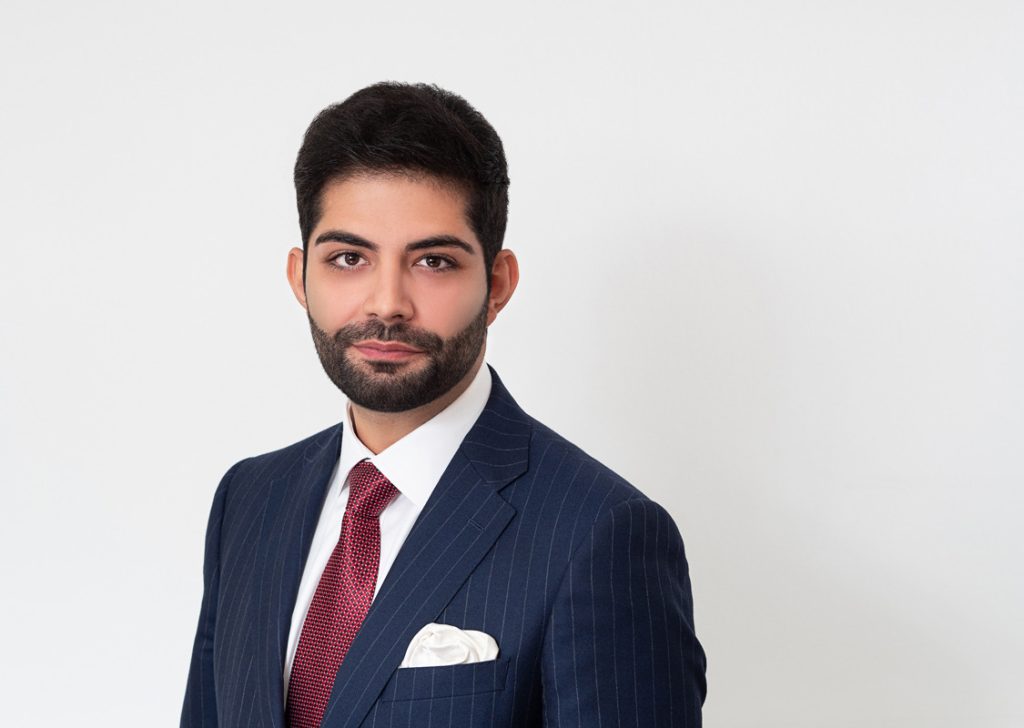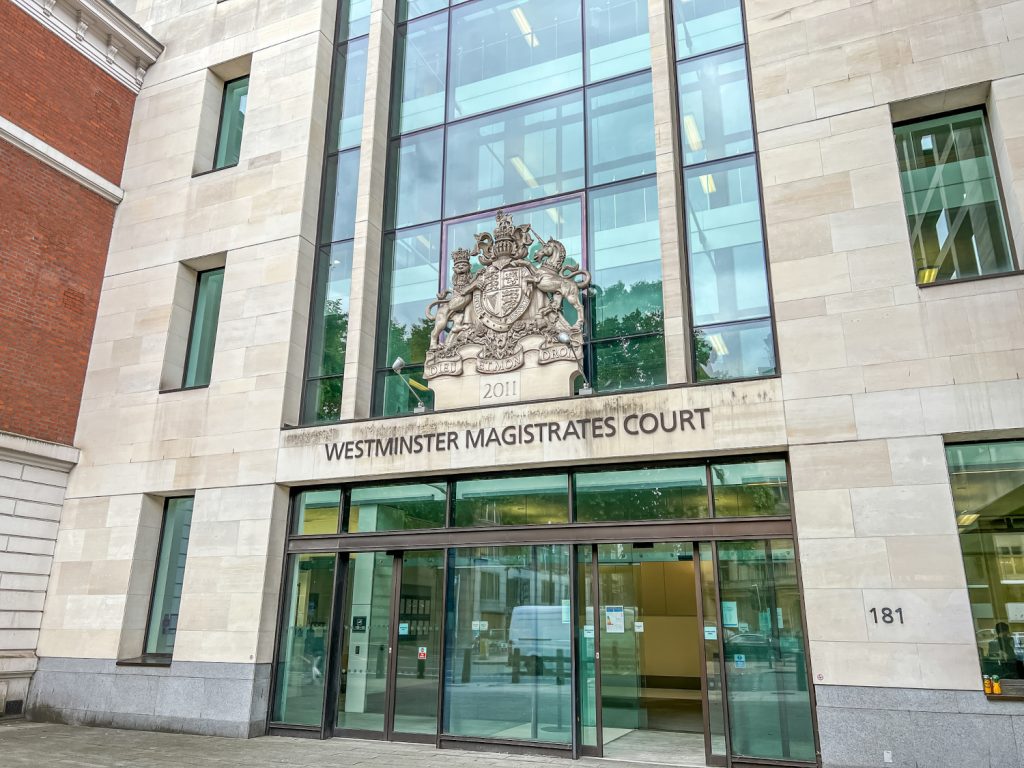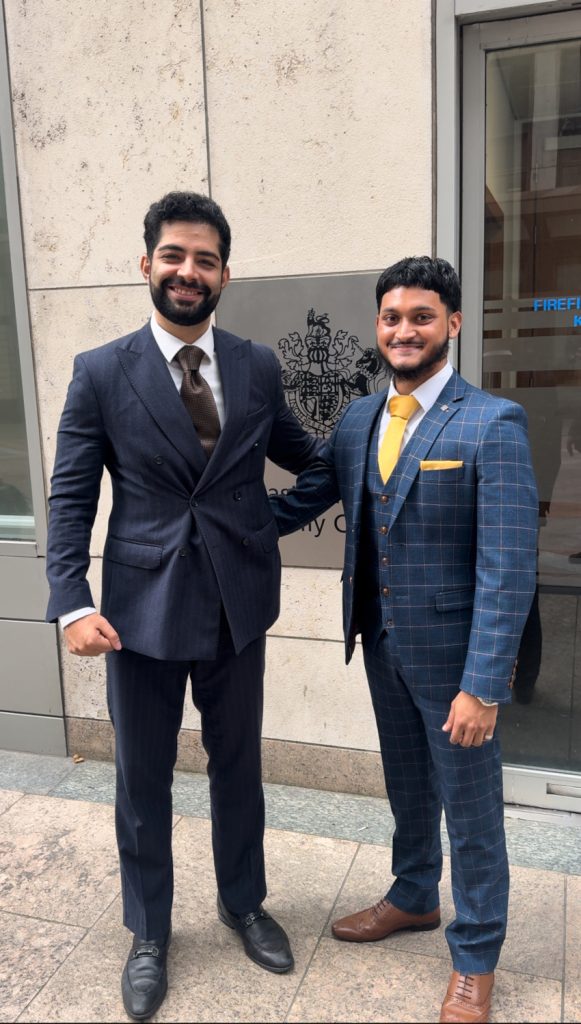LLB3 student Hamedur Rahman was lucky enough to interview City Law School LLB and bar course alumni Milad Shojaei (barrister at 33 Bedford Row) about his journey to the bar…
Thanks for joining us Milad, so excited to speak with you. You studied for your LLB and combined Bar course and LLM at City – what made you stay with City, and did you find it a challenge adapting to what was needed from two such different programmes?

Thank you very much for having me. I really appreciate being here. Staying with City was a no-brainer for me. I was well aware of its high ranking among law schools and the valuable resources it offered. The Pupillage Advisory Service was particularly crucial, providing key mentorship opportunities and pupillage workshops. Additionally, the BVS LLM CLE module included voluntary placements on their partnerships with FRU or Pro Bono Community, ensuring that continuing with City would put me in good stead.
The transition from LLB to BPTC (now called the BVS) combined with the LLM was quite daunting. The undergraduate focus is more on theory and exam skills, whereas the BPTC emphasises the practical skills needed to become a barrister. At least four of the modules I completed were advocacy-based, making it a significant leap. However, I was fortunate to undertake the BPTC with some of my friends from undergraduate studies, and we supported each other through the process.
The first three months were especially difficult. On the very first day, we had to pick up our books, including the White Book and Blackstone’s Criminal Practice, which were so numerous that we needed luggage to carry them all. This initial experience quickly highlighted how different this phase was from undergraduate studies. The schedule was intense, with lectures, tutor sessions, high expectations, and mock exams approaching quickly. It became clear that this was not just about learning theory, legal principles, and honing exam writing skills. Instead, it focused on mastering core skills, understanding advocacy, and grasping key topics like civil litigation, criminal litigation, and ethics. While the transition was challenging, dedication helped in overcoming these hurdles.
If you could go back to your university self, what would you do differently / the same? Is there any advice you would give to LLB student Milad?
If I were to do things differently, I would have taken full advantage of all the opportunities available to me. Back then, I was quite rigid, focused on a specific area of law and convinced that nothing would change my mind. Now, as I manage a multidisciplinary practice and handle various tasks, I realise it would have been beneficial to have a foundation in more areas. I would advise my undergraduate self to engage with different opportunities, explore various areas of law, and also to participate in vacation schemes to get a sense of what it is like to be a solicitor. Broadening one’s horizons is crucial.
What I would do the same is maintain a balance between academics and extracurricular activities. There is more to life than just studying. It’s about the journey, the friends you make, the connections, and the memories. I’m glad I prioritised this balance and still cherish those experiences. One important lesson I’ve learned is that you don’t know what you like or dislike until you try it. For example, I had no idea I would love family law and financial remedies as much as I did until I experienced them firsthand. Similarly, you might think you do not enjoy for example, corporate law, but a particular vacation scheme or work experience could change your perspective.
It’s also beneficial to explore different roles, even if you are set on a specific career path. For instance, if you are determined to become a solicitor, undertaking a mini-pupillage can be invaluable. Not only does it help you understand why you want to be a solicitor by highlighting the differences between the professions, but it also provides insight into the challenges faced by barristers. As I said earlier, given the chance to go back, I would certainly have participated in vacation schemes. Gaining early insight into the work of solicitors would be so helpful now as a barrister, allowing me to better understand what those who instruct me are experiencing. This mutual understanding fosters a more collaborative relationship. Similarly, if solicitors understand the day-to-day challenges faced by barristers in court, it enhances their ability to work together effectively.
As law students, we know gaining work experience is crucial. What was the one piece of work experience you felt you gained most from and what other aspects can we highlight on a CV to make us stand out besides gaining work experience?

For me, the role of legal advisor at the magistrates’ courts was pivotal. It gave me a sense of confidence, competence, and purpose in the courtroom. This experience made the transition from the first six pupillage to the second six pupillage, where I was in court every day, much smoother and less daunting. I was familiar with the procedures and had firsthand experience in the courtroom, which served as a significant benchmark for me. I specifically chose this job as a springboard for my career, although it is a rewarding career in itself, with many gifted legal advisors.
For aspiring lawyers, it is important to highlight aspects of their CV that showcase their adaptability and modern skills, even if they are not directly related to legal work. In today’s digital age, skills such as working paperlessly and having tried-and-tested methodologies are increasingly relevant. For example, my experience working at a tech startup equipped me with valuable transferable skills and taught me how to manage a practice as a barrister. These are not just work-related experiences but also human skills and self-developed capabilities that are crucial in the legal profession.
You worked for several years at Casedo. This must have been an exciting time as it was the first legal tech product developed by a barrister (Ross Birkbeck). What were the key takeaways for you on this experience, and what types of technology do you think will make the most impact on legal practice in the future?
Working with the Casedo team was one of the most rewarding experiences of my career. I had the privilege of working closely with Jim Hitch, the current CEO, and Ross Birkbeck, the founder (read a Lawbore interview with Ross from 2019). This experience was rewarding not only because of the fantastic team, software, and company but also because it allowed me to engage with the legal technology sector. This unique position gave me insights into the legal profession from an external perspective, highlighting the opportunities available to graduates who are not directly pursuing a legal career but are still closely related to the field. My experience at Casedo equipped me with skills for managing a paperless practice and provided a broader understanding of the intersection between law and technology. This has made me particularly excited about the potential of artificial intelligence in the legal sector. Despite the controversy surrounding AI, I believe we are fortunate to be part of a generation that can fully leverage its benefits in the legal field.
I understand the concern that AI might lead to a lack of originality in people’s work due to its ability to assist everyone in similar ways. However, I believe that if one is unique enough, they will not rely on AI in a manner that diminishes their originality. For me, AI serves as a supplementary tool rather than a replacement for creativity or individual thinking. Currently, AI is in its early stages, but looking ahead from 10 to 20 years, significant advancements could be made. For example, if AI gains access to comprehensive legal databases like Westlaw or Lexis+, it could drastically reduce the time spent on research. Instead of spending 10 to 20 hours reading and searching for case law, AI could provide the necessary information in seconds. This would free up more time for lawyers to focus on their submissions, advocacy, and client interactions, rather than on time-consuming research. Therefore, I do not believe AI will take away originality. The impact of AI on work depends largely on how individuals choose to use it. If used wisely, AI can enhance efficiency and allow professionals to concentrate more on their unique contributions.
What stood out from your pupillage at 33 Bedford Row and gave you confidence you were at the best set for you?

What sets 33 Bedford Row apart, especially during Pupillage, is not just the in-house advocacy, training, and support they offer, but their genuine commitment to diversity. Chambers truly practices diversity, with members from various backgrounds and walks of life, making it a real asset. The diverse members are not only inspiring but also extremely friendly and welcoming. This inclusivity means I can easily seek career advice and case guidance from both juniors and seniors, making me feel at home.
Additionally, the exceptional clerking team has always been accommodating, contributing to the positive environment. Witnessing Chambers grow every year and knowing that I am part of that growth is incredibly fulfilling. This combination of diversity, support, and growth makes 33 Bedford Row an exceptional place to be.
You are known for your sterling reputation ‘for compassionate and tactful handling of sensitive matters’. What’s your advice to establish client rapport? As someone new to this, can you offer me any tips on how to develop my communication skills for future dealings with individuals going through challenging times?
I will give you three tips.
Firstly, speak in plain language: When dealing with someone in a vulnerable situation, avoid using complex legal jargon that they might not understand. Overcomplicating the conversation can lead to increased stress and confusion. Instead, communicate in clear, simple terms. Be patient, take the process slowly, and be mindful of the client’s needs. If necessary, include breaks to ensure they do not feel overwhelmed. The goal is to ensure that they fully understand the advice and support you are providing.
Second, establish empathy: Vulnerable clients need to feel that you are genuinely concerned about their situation. Show empathy and build a strong rapport. Remember, you are their voice, giving representation to the voiceless. Demonstrating empathy helps in building trust and effectively supporting their needs.
And finally, get practice in real-world settings: Gain practical experience by volunteering at organisations like law clinics, Citizens Advice, or other similar services. These environments offer invaluable opportunities to work directly with vulnerable individuals, helping you develop and refine the skills necessary to communicate effectively and provide meaningful assistance. By following these guidelines, you will be better equipped to support and advocate for vulnerable clients, ensuring they receive the understanding and assistance they need.
Have there been any pivotal moments in your career where a single case has had a direct impact on you?

Yes, I recently worked on a significant case earlier this year. I was instructed to represent a mother who was a victim of domestic abuse by the father. This case had been ongoing in the courts for nearly two years, and I had built a strong rapport with my client since the beginning of my pupillage and continued after obtaining tenancy. The case presented serious evidential limitations, which are common in domestic violence situations. Often, victims do not collect evidence at the time of the abuse because they do not anticipate needing it for future legal proceedings. Consequently, we relied heavily on inferences rather than direct physical evidence.
Through extensive cross-examination, I managed to get the father to make compelling concessions, which I then used to substantiate the allegations in my submissions. This case particularly stands out to me for two key reasons. Firstly, the importance of legal representation. The family courts have recently introduced Qualified Legal Representatives (QLRs) to assist with cross-examination, highlighting the necessity of skilled legal professionals. Effective cross-examination is crucial for obtaining concessions and advancing a case successfully. Secondly, the importance of preparation. Mastering the case bundle and making the most of the available evidence is essential. Thorough preparation allows you to present the strongest possible case, even when evidence is limited. This experience reinforced the critical role of legal representation and meticulous preparation in achieving justice for victims of domestic abuse.
In your experience, what are some common challenges or complexities that arise during fact-finding hearings, and how do you approach addressing them to ensure a fair and accurate determination of the facts?
In my experience, the principal challenge with fact-finding hearings, especially those concerning domestic abuse, is in dealing with litigants in person, the emotional dynamics, and the nature of the evidence involved. Contrary to what one might think, having a litigant in person on the other side does not provide an advantage; it actually slows proceedings down. This situation complicates the process of narrowing issues and reaching settlements. To manage this, I take the time to speak plainly with the other side, ensuring they understand their options. While I must avoid advising them, it’s crucial they trust that, as an officer of the court, I am truthful and transparent. This approach helps in agreeing on certain matters and ultimately narrows down the issues for the fact-finding hearing itself.
Moreover, the emotional dynamics in these hearings can be intense. Typically, one party alleges abuse, while the other denies it, creating a situation where both cannot be right. Consequently, tensions can run high and emotions can be volatile. To address this, I ensure I am thoroughly familiar with the case documents. Mastering the papers means I know exactly where to find each piece of evidence. If the judge requests a specific page from the bundle, I can quickly reference it. This preparation helps maintain focus and manage the emotional and evidentiary challenges inherent in such hearings.
How does your experience in criminal law, particularly in areas like domestic violence or child abuse cases, enhance your ability to handle family law matters such as protection orders and child custody disputes?
The art of advocacy and cross-examination is most effectively honed in criminal law due to its development of highly transferable skills. As a criminal practitioner, one gains cross-disciplinary insights that prove invaluable. For instance, handling cases involving domestic violence and criminal law often intersects with family law, where clients may face criminal charges alongside family legal issues. This crossover enhances proficiency in both areas, making skills from criminal law beneficial in family law, and vice versa.
How does the introduction of no-fault divorces in the UK change the dynamics of divorce proceedings, particularly in terms of reducing conflict between parties and what are some key legal changes for couples regarding asset division, child custody, and financial settlements?
In your experience, how has the shift to no-fault divorces impacted the way family lawyers approach their clients’ cases and negotiate settlements?

The introduction of no-fault divorce in April 2022 has significantly transformed the dynamics of divorce proceedings. Previously, divorce required proving that one party was responsible for the marriage breakdown, which often led to contested cases, especially in instances like adultery. This adversarial approach frequently resulted in prolonged court battles.
With the advent of no-fault divorce, there is no longer a need to assign blame, simplifying the process to a more administrative one from start to finish. This has made obtaining a divorce easier and has subsequently increased financial remedy proceedings, as divorcing parties now focus on resolving asset distribution.
This shift is not only procedural but also cultural. The reduction in adversarial divorce processes and the associated acrimony might lead to more cooperative and compromising attitudes in related disputes, such as those concerning children and finances. Starting the separation process without the bitterness of fault-based accusations sets a less contentious tone for the entire proceeding, potentially fostering a more amicable resolution. The long-term cultural impact of this change is yet to be fully seen, but it suggests a move towards more harmonious divorce processes.
What accomplishment, either personal or professional, are you most proud of?

Pupillage is undoubtedly my proudest accomplishment. I would never take for granted the immense effort I put into securing it. I remember spending countless hours on my applications and planning years in advance to present myself as a strong candidate. While many people mention that luck plays a role in obtaining pupillage, I found that the harder I worked, the luckier I became. The dedication and hard work I invested in the process are what make achieving pupillage so significant to me.
Thanks to Hamedur for this fascinating interview, and to Milad for being so generous with his time.
Hamedur has a keen interest in family law and a strong ambition to become a family solicitor. Beyond his studies, he actively engages in teaching calisthenics to youths in various boroughs, promoting both fitness and community cohesion. His dedication to giving back to local communities drives his volunteer work with the charity Under One Sky, where he contributes to efforts to end homelessness. He thrives on meeting new people and making a tangible impact in their lives. Recently, he discovered a hidden passion for running and now aspires to one day participate in charity runs for organisations such as Save the Children and The British Red Cross.

